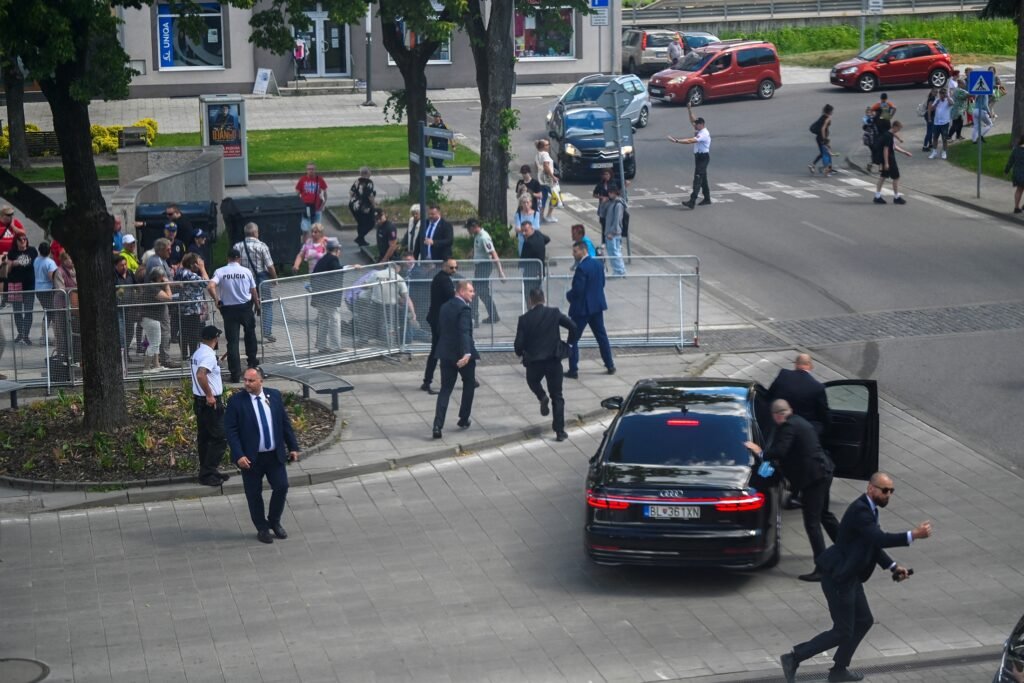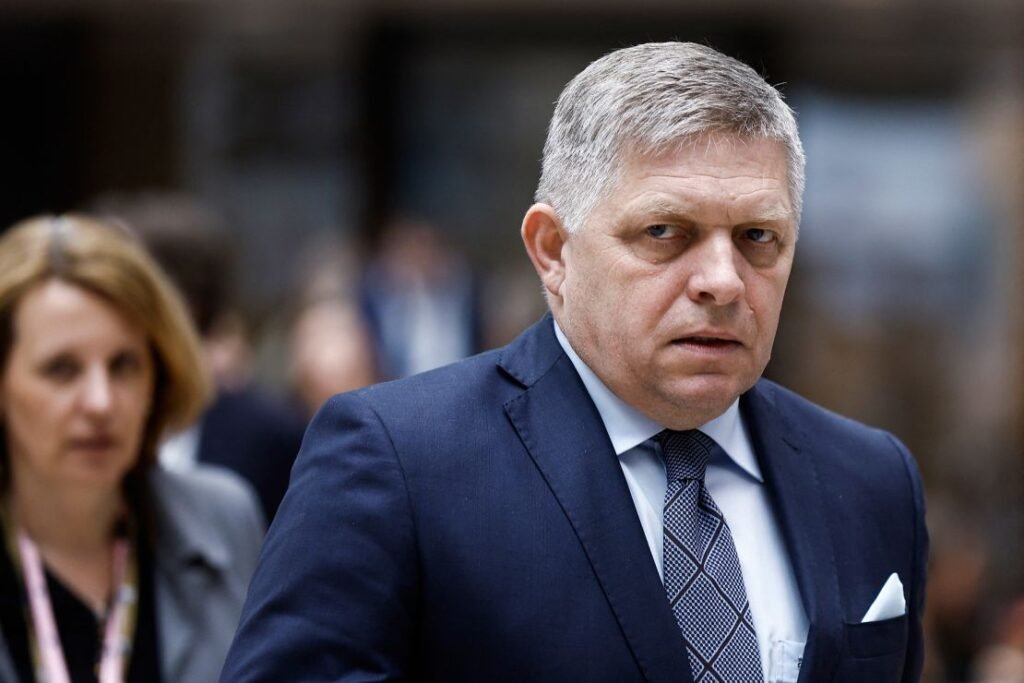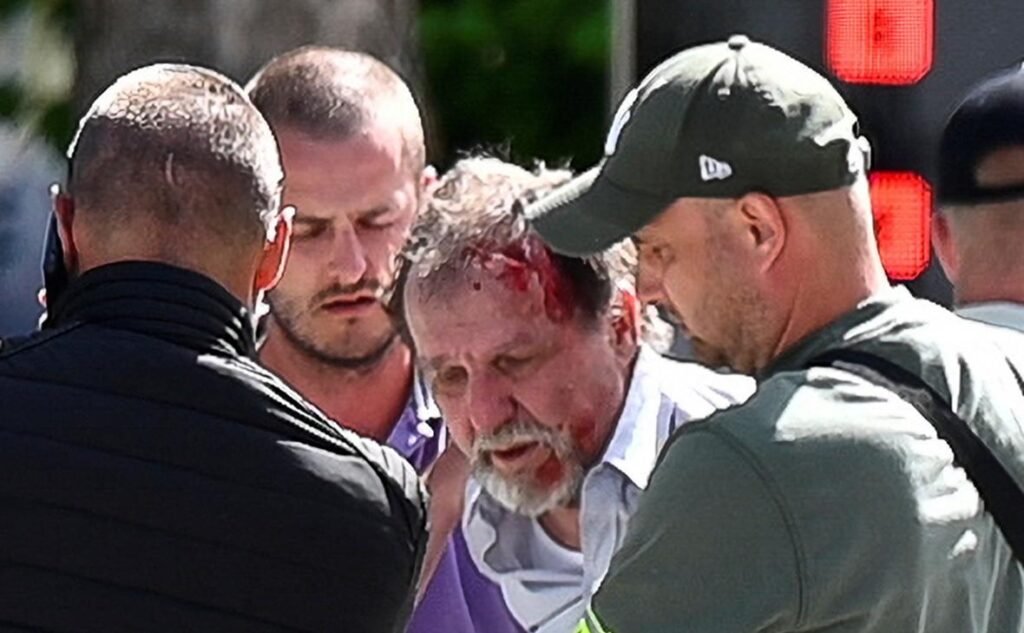
In a time when political tensions are escalating across Europe, Slovakia finds itself in a uniquely challenging position. On May 15, Prime Minister Robert Fico narrowly survived an assassination attempt, underscoring deep-seated political divisions within the nation. The attacker, a former security guard with a history of dissent against government policies, approached Fico during a visit to the town of Handlová, where the Prime Minister had been meeting with locals. This event has sent shockwaves through Slovakian politics, reigniting debates about democracy, dissent, and the limits of political expression.
For many, the attempted assassination highlights a broader crisis in Slovakia’s political culture. Liberal elites have long portrayed Fico, a leader of the left-nationalist Smer party, as an adversary of democracy, framing his conservative and economically left-leaning views as threats to Slovakia’s alignment with European liberalism.

Meanwhile, Fico and his allies argue that they represent the true voice of the Slovak people, calling out what they see as foreign interference in national politics.
A Nation Struggling to Define Democracy
At the heart of Slovakia’s political turmoil lies a question that has haunted the nation since its independence in 1993: How can a democracy accommodate dissent without fracturing? For many, the roots of Slovakia’s political challenges stretch back to the post-socialist period, during which the newly established liberal elite sought to build a democracy shaped by market-oriented reforms. For decades, dissenting views—especially those critical of neoliberal economic policies—were marginalized or painted as backward, making it difficult to establish a robust political community.
This attitude persists today, with many of Fico’s policies being met with alarm by liberals, who view his economic populism and skepticism towards NATO’s involvement in Ukraine as dangerous. Fico’s political opponents frequently characterize his stance as regressive, reinforcing a longstanding tension between liberal aspirations and a desire among many Slovaks for greater national sovereignty.
The Fallout from the Attack
Details of the attack in Handlová became clear soon after the incident. The 71-year-old assailant, known for his political poetry and unconventional views, approached Fico and fired multiple shots, hitting him in the leg, hand, and stomach. The response was immediate and polarized. Allies of Fico blamed the incident on hostile media coverage, claiming that a climate of contempt towards the Prime Minister had encouraged violence. Initially, many liberal commentators refrained from assigning blame, though calls for the resignation of high-ranking officials close to Fico soon surfaced.
The situation quickly devolved into mutual recriminations, with Fico’s supporters accusing liberal elites of creating an intolerant atmosphere.

Meanwhile, international media framed the attack within narratives of Slovakia’s “polarized” politics, pointing to Fico’s “extreme” positions as contributing to the charged environment. Speculation even emerged online, with some claiming that the incident was staged to justify a crackdown on civil liberties.
The Political Divide Deepens
Fico’s return to power in 2023, after three years in opposition, has reignited Slovakia’s long-standing political divides. His victory, followed by the presidential win of his ally Peter Pellegrini, marked a shift back to a culturally conservative and economically populist government. Fico’s administration quickly introduced measures like a windfall tax on banks, retained social welfare programs, and initiated an independent foreign policy direction focused on strengthening ties with Asia.
His policies have sparked a reactionary response from Michal Šimečka, leader of the centrist Progressive Slovakia party, who ramped up rhetoric against Fico. However, Šimečka’s criticism has largely centered on the perceived threat Fico poses to Slovakia’s European ties, rather than offering a comprehensive alternative. This focus on framing Fico as an existential danger has fueled Slovakia’s already polarized political climate, turning each policy debate into a battle over the nation’s future direction.
Revisiting Slovakia’s “Transition” Narrative
For many post-socialist liberals in Slovakia, the 1989 revolution signaled a break with the country’s socialist past and a commitment to a Western, free-market democratic model. This ideological shift was cemented with Slovakia’s accession to the European Union in 2004 and the adoption of the euro in 2009. However, the rigid adherence to this transition narrative has left little room for alternative viewpoints, and critics argue that this has stifled political debate in Slovakia.
Fico’s rejection of NATO’s policy in Ukraine and his calls for a negotiated peace have been met with accusations of betraying Slovakia’s international obligations. For his supporters, these policies represent a legitimate critique of the country’s alignment with EU and NATO interests. But for liberal elites, Fico’s stance on foreign policy has made him a symbol of resistance to the “civilized” path envisioned for Slovakia by the West.
Beyond Unity: Embracing Political Diversity
While the immediate reaction to the attempt on Fico’s life has been calls for unity, the longer-term solution may require Slovakia to embrace a broader spectrum of political ideas. This approach aligns with political theorist Chantal Mouffe’s concept of “agonistic pluralism,” which recognizes the need for opposition within democratic societies. Rather than seeing adversaries as enemies to be defeated, political opponents must be accepted as legitimate voices with whom one disagrees.
As Pellegrini noted in the wake of the shooting, Slovakia must create a political environment where dialogue and democratic competition are prioritized. This means that disagreements—on policies like Slovakia’s approach to the EU or NATO—should be viewed as differences of opinion, not existential threats. Political legitimacy cannot rely on conformity but must be built through genuine public engagement and tolerance for dissenting viewpoints.
Slovakia’s Democratic Future
If Slovakia is to move forward, both sides of its political spectrum must make concessions. For liberals, this means shifting away from framing every disagreement as a crisis. Instead of reacting defensively to Fico’s critiques of foreign policy or economic policies, they would benefit from articulating a vision that addresses citizens’ immediate concerns—like economic security and social welfare—while fostering a constructive relationship with Europe.
Fico and Smer, meanwhile, must resist the temptation to portray their liberal critics as foreign puppets or enemies of the people. If they genuinely aspire to protect Slovakia’s sovereignty, they should focus on articulating how Slovakia’s political autonomy can coexist with international partnerships rather than leaning on nationalistic rhetoric that risks alienating parts of the electorate.
As Slovakia navigates its path forward, its political leaders must recognize that democracy thrives on differences. True democratic strength lies not in suppressing dissent but in building a political culture that can withstand diverse viewpoints without fracturing. For Slovakia, this means embracing a more nuanced understanding of political opposition, one that acknowledges that unity does not require uniformity.

